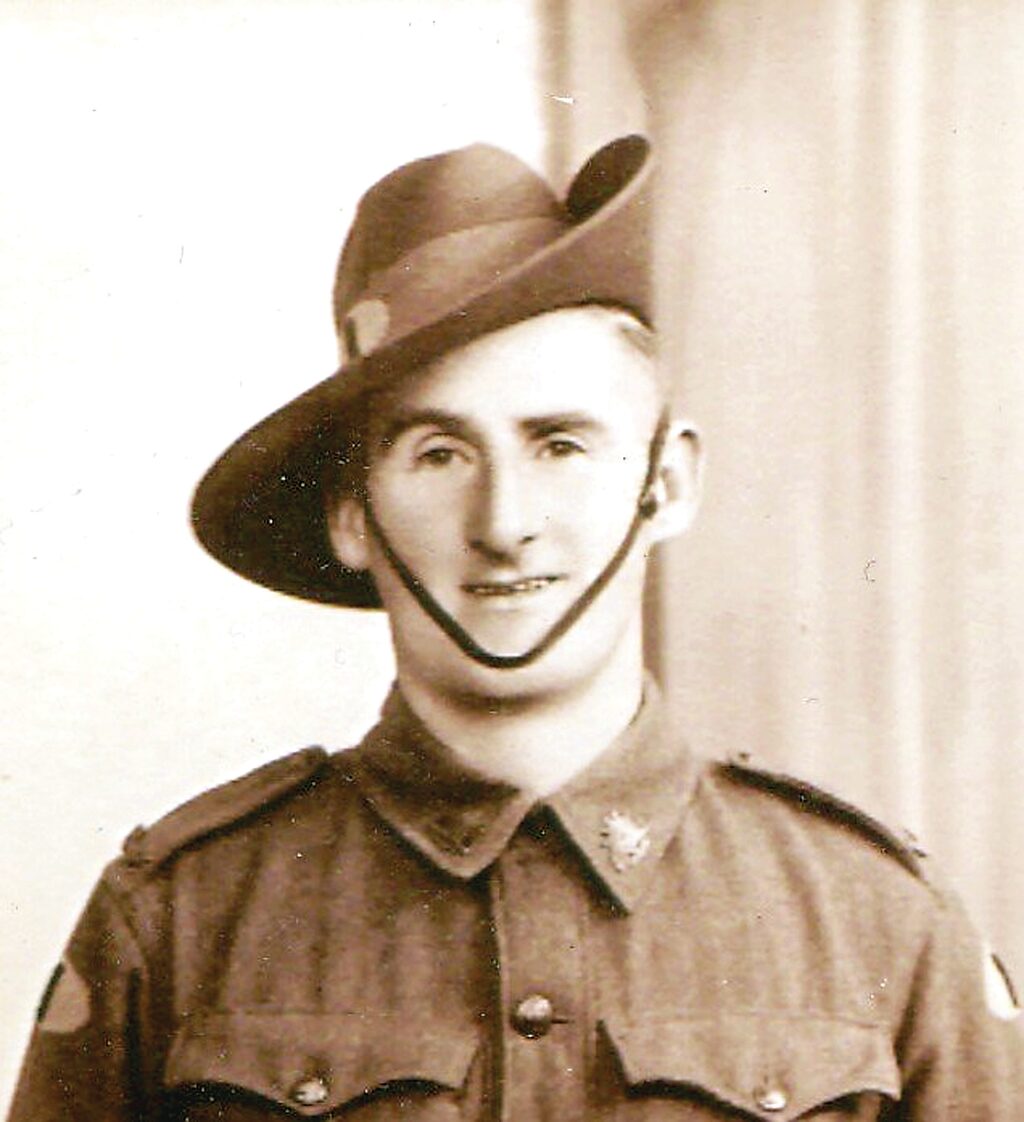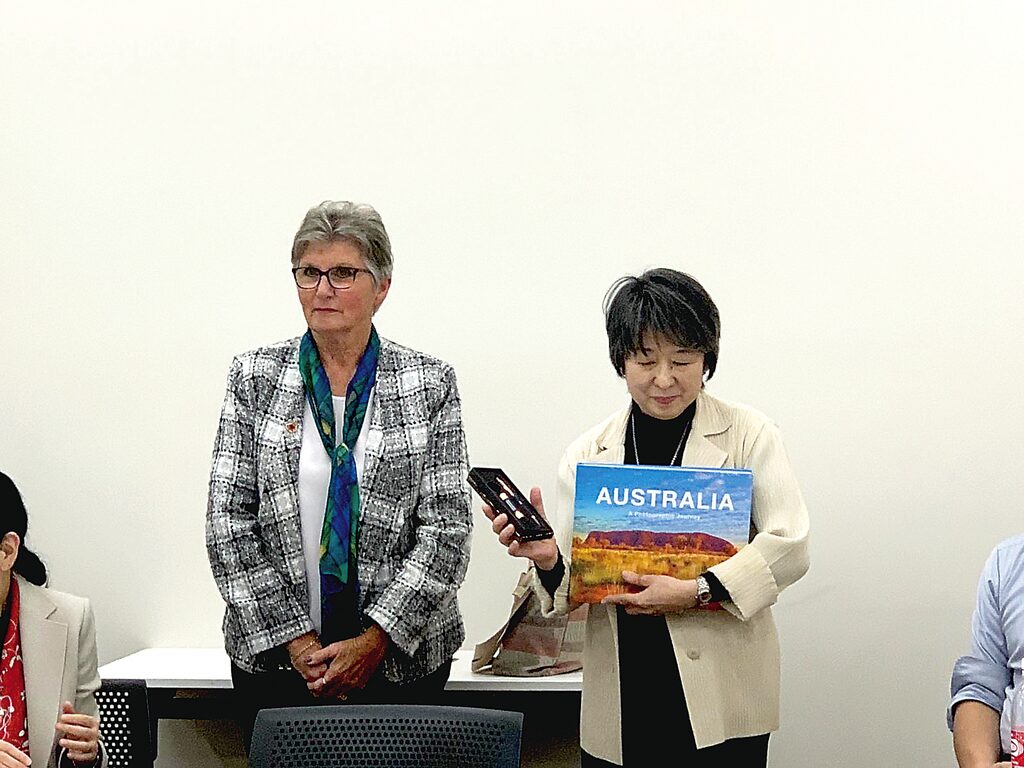By ZAIDA GLIBANOVIC
“IT is almost eight decades since my father, Jack Lonsdale and my two uncles were imprisoned by the Japanese Army – Japan (this year) welcomed me in the name of reconciliation,” said Joy Derham, daughter of a Prisoner of War (POW), speaking before this year’s Anzac Day commemoration.
In early March, Ms Derham was invited to visit the country where her father was imprisoned for three-and-half years under the 2024 Japanese-Australian Grassroots Exchange Program.
Maryvale local, Ms Derham was fortunate enough to be invited to Japan following an essay submission outlining the cruel treatment her father and uncles suffered under capture.
Ms Derham’s father, John (Jack) Lonsdale, and her uncles, Ivan and Patrick Sephton, were inspired to enlist in the army after the outbreak of World War 2. The three enlisted in the Australian Imperial Force (AIF) in May 1940.

The three trained in Victoria at Bonegilla and Darley, and once ready, the troops in training were shipped out to Singapore in August 1941.
Serving in the 2/29th battalion in the AIF, the trio’s first taste of the conflict was at the Battle of Muar in January 1942. The last major battle of the Malayan Campaign during World War 2 took place from January 14-22.
Japanese soldiers suffered heavy losses in the Gemensah Bridge ambush and in a subsequent engagement a few kilometres north of the town of Gemas. Members of the Australian 8th Division killed an estimated 600 Japanese 5th Division men in an ambush near the bridge, while Australian anti-tank weapons damaged numerous Japanese tanks. The engagement resulted in the most Japanese losses of any action in the Malayan campaign.
Despite the initial success, the men of the 2/29th battalion were forced to escape into the jungle and regroup in Singapore, only to be caught at the fall of Singapore.
The trio were taken to the Selarang Barracks Changi, situated on the north-eastern tip of Singapore.
Selarang Barracks was built between 1936 and 1938 to house an infantry battalion. During the Japanese Occupation (1942–45), it was used by the Japanese Imperial Army to hold Australian and British POWs.
The Japanese camps were different than most in history, not built based on ideological, racial or religious differences; they were built with a brutal pragmatism in mind. The treatment of the prisoners reflected a disdain for the defeated.
Conditions in the Changi prison were unbearable, with paralysing heat and little sustenance. There was only two working taps with water, and each prisoner was limited to one quart (0.95 Litres) to use each day.
As Japan prepared for a prolonged war, they put their prisoners to work.
“My father along with my uncles joined work forces that were formed, believing there would be better conditions,” Ms Derham said.
“Their work force was called F Force. It has the dubious history of being the most ill-fated force sent up the line, also having the highest death rate. F Force was unfortunate in that it was never allowed to settle, and frequently, they moved from one camp to another. Their work was responsible for cutting a track through the jungle to begin the road which was followed by the railway line.
“My father, along with my two uncles, marched the 316 kilometres to help build the infamous Burma-Thailand Railway.”
Tragically, Ms Derhams’ uncles did not survive their time spent on the F Force, succumbing to their mistreatment and starvation like more than 30,000 other POWs.
Jack Lonsdale survived and returned to Changi in December 1943, where he stayed until the end of the war.
With around 15,000 men held in prison, those thinking of escaping reconsidered, with many executed for trying. Many men died from the conditions in the camp, others from disease and the work.
“Numerous beatings, starvation and exhaustion at the hands of the Japanese, and living on a cup rice a day and scrounging for food daily impacted my father’s well being when he returned home to Melbourne – weighing only seven stone,” Ms Derham said.
Mr Lonsdale a previous butcher, found work in Moe as a plasterer as he attempted to resume a post-war life.
“My father never spoke of the war or his years as a prisoner of the Japanese – he dismissed it as a time not to reflect, ‘It was another generation!’ This, of course, made me develop my curiosity into the history of those war years.”
Ms Derham, the mother of four and grandmother of eight keeps busy researching war history.
Having already travelled to Thailand, Singapore and Burma – Japan would be the natural next step in her quest for knowledge.
Ms Derham joined the grandson of a POW from Queensland, Trent Bielken, and an RSL representative, Duncan Anderson, on an eight-day tour of Japan.
The Japan-Australian Grassroots Exchange Program aims to deepen the mutual understanding of the peoples of Japan and Australia by inviting descendants of former Australian POWs to Japan through the RSL network. By participating in this exchange, representatives of the RSL and descendants of POWs have an opportunity to promote post-war reconciliation, understanding and goodwill between both countries.

The tour included flights, shared accommodation, domestic travel within Japan, a meal allowance and travel insurance covered by the Japanese Ministry of Foreign Affairs.
The itinerary included meetings with various government representatives and students, a dinner hosted by the Foreign Ministry, a visit to the Commonwealth War Cemetery, and general sightseeing.
“They looked after us, we were treated like royalty,” Ms Derham said.
Growing up in Moe, Ms Derham said her father struggled to talk about his time in the war.
“He was told not to talk about it because no one would believe what happened – it was so horrendous, she said.
“It wasn’t known back in that day – they didn’t know about PTSD, it was nothing then. When they were discharged they were told to just get on with your life.”
Ms Derham, as a young girl living at home with her brother, recalls seeing her father upset. Her mother Edie would pull them aside and tell them, “It’s to do with the war,” but it wasn’t until she became actively involved in researching her father’s life that she was able to understand.
Despite experiencing the horrors of war, Ms Derham said her father was never bitter towards the Japanese.
“I got some sense of closure from being there,” Ms Derham said.
The Japanese government has made efforts to revise history textbooks and include more balanced perspectives on its imperial history and has worked on strengthening reconciliation between the Allied countries.
“I felt very privileged to be part of this journey, to seek closure and felt they were extremely genuine in their acknowledgement, understanding and the display of remorse for the way their forefathers had treated the POWs,” Ms Derham said.












